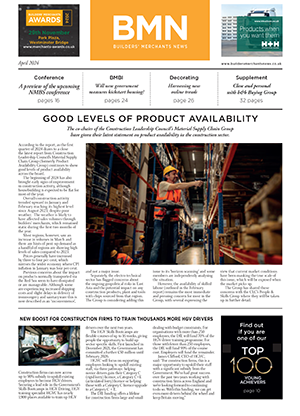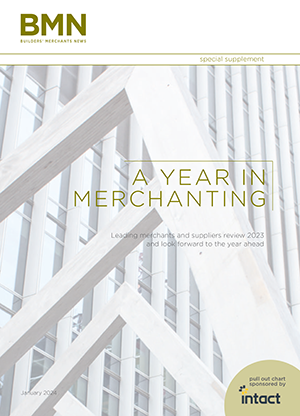What’s in store for the merchant sector? Which areas will be buoyant and which will not? Here, some of the key players reveal where they see opportunities and challenges for our industry as we enter the New Year with a mix of positivity and trepidation. Lisa Arcangeli reports.
“No-one would say that 2012 has been a great year, and I think most are expecting more of the same in 2013,” says John Newcomb, managing director of the Builders’ Merchants Federation.
“There are, of course, regional variations, with the North East, Scotland and Wales being squeezed more than the South and South East of the country. Everyone is waiting to see what the winter brings, and there are lots of people praying for mild, dry weather in the first quarter of the year.
“The final quarter of 2012 saw sales pick up and there seems to be a greater degree of optimism among mid-sized independents who are holding up better than the rest of the industry right now. If the current trend continues, those forecasting a slight year-on-year increase of 1% or 2% should prove correct.
“The BMF is known for its excellent training, business support and policy influence – a powerful formula that we want more companies to benefit from. The major change for 2013 is how we interact with the industry. We want to make members’ lives easier, so we are taking the BMF to the members rather than waiting for them to come to us.
 “We will be hosting more events at our new HQ in Coventry, not just our own, but also buying group meetings, seminars, training courses and other networking opportunities. We will be meeting members at more exhibitions than ever before, including Totally Tools in February, where we are exhibiting for the first time. And, every member of staff, including the two additional staff members who are joining us in the New Year, will spend at least one day a month visiting members on site. One of the first tasks of our new southern region manager will be getting regional meetings up and running again in the South of the country, complementing those in Wales, Scotland, the North East, the East Midlands and Yorkshire.
“We will be hosting more events at our new HQ in Coventry, not just our own, but also buying group meetings, seminars, training courses and other networking opportunities. We will be meeting members at more exhibitions than ever before, including Totally Tools in February, where we are exhibiting for the first time. And, every member of staff, including the two additional staff members who are joining us in the New Year, will spend at least one day a month visiting members on site. One of the first tasks of our new southern region manager will be getting regional meetings up and running again in the South of the country, complementing those in Wales, Scotland, the North East, the East Midlands and Yorkshire.
“There will be a new look to the BMF too, in 2013. Our dynamic and more proactive approach will be visually reflected in an updated, modern and contemporary brand identity and strapline – One Industry, One Voice.It will start to appear on all printed and digital material at the end of January to coincide with our move to Coventry.”
Every industry needs a strong body to represent its interests, he believes. “Builders merchants are no different. The BMF is the only trade association that has the interests of builders’ merchants as its sole focus. That gives merchants a stark choice. You can join and help strengthen your industry’s voice, or you can stand on the sidelines and have no say. Merchants can choose from a number of buying groups, but there is only one choice of trade association. In difficult trading times it is even more important to act collectively – the more businesses we represent, the greater our voice and influence will be. We want the support of the industry to give us the power to get things done for them.”
According to Chris Hayward, managing director of NMBS, 2013 will be another tough year for the industry. “I am confident, however, that independents will continue to outpace the market, as they continue to add new branches and increase the breadth of their stock offering as they look to widen their market share. Independents can expect a much larger exhibition from NMBS, where already suppliers are promising their best-ever promotions as NMBS celebrates its 50th trading year.
“We have already made plans for an extra special event in London to mark this major milestone, where our suppliers and members will be invited to a prestigious London venue to celebrate 50 years of successful trading.
“The long-expected arrival of the Green Deal initiative at the end of February should give the market a boost and, with DECC being given a special dispensation by government to actively advertise and promote it nationally, then perhaps we can start to see an uplift in the sales of Green Deal-related products such as insulation and heating.”
Merchants need to remain focused on keeping costs down and managing their cashflow, with a strict eye on credit limits and hopefully avoiding any serious bad debts, Mr Hayward states. “The impact of new legislation concerning CE Marking takes effect from July, so merchants and suppliers need to ensure they have a sound strategy for handling the products concerned.
“Most independent merchants already have all the finance skills necessary for managing their businesses, they just need to remain focused on what they do best and not allow credit limits or payment terms to drift too much just to keep sales.” NMBS will provide links to information and updates on what is required from CE Marking for its members and suppliers, along with organisations like the CPA and the BMF.
NMBS has also launched a new logo to coincide with its 50th year and much of its communications and literature will be celebrating this success and what we have planned to make the future even more successful for both our members and suppliers,” Mr Hayward reports.
“NMBS offers strong invoice clearing services for all the major independent buying groups and we aim to grow these strategic alliances in 2013, while also developing our buying services for our standalone independent merchant members.
“We were pleased to be nominated for awards for our IT developments and marketing and events and will continue to invest time and resource to ensure we stay on top of our game in these fields.
 “NMBS is already the No.1 organisation for electronic trading in the industry and, with our in-house developed on-line report centre, we offer 24/7 access to statements/remittances, invoices and credits, turnover reporting and invoice dispute resolution. We also offer a debt guarantee to our suppliers and instant account access to our approved suppliers for merchant members,” Mr Hayward says.
“NMBS is already the No.1 organisation for electronic trading in the industry and, with our in-house developed on-line report centre, we offer 24/7 access to statements/remittances, invoices and credits, turnover reporting and invoice dispute resolution. We also offer a debt guarantee to our suppliers and instant account access to our approved suppliers for merchant members,” Mr Hayward says.
“With our continued commitment to offer a one-stop shop approach for all our members’ needs, we hope to make life easier for everyone.
“By working together independents have a fighting chance of competing with the nationals and ensuring that they stay firmly on the agenda with major suppliers, who genuinely recognise that buying groups can offer the best of both worlds, national distribution but with local focus.
“NMBS is focused on independents and works hard to ensure it is supporting their trading activities wherever possible. Our only goal is to make them more profitable. With that in mind, we encourage all our members to get involved and help set our agenda for the future,” Mr Hayward concludes.
“2012 wasn’t the year we had hoped it to be,” says James Norton, executive vice chairman of the National Buying Group and group managing director of Frank Key. “It’s a mixed picture. Economic activity hasn’t picked up as expected and the weather hasn’t helped matters either, particularly on the heavyside and landscaping side of our businesses.”
This depressed level of activity, Mr Norton says, is not typical of the entire country though. “At our regional and board meetings, a different picture of performance has emerged. Activity in the South East is definitely picking up and there is a view that it is well ahead of the rest of the market. When it comes to civil engineering and heavyside products, however, sales are lagging behind the lightside and high margin products.
“The areas of greatest sales have been from high value products – kitchens and bathrooms. From an end-user point-of-view, the lower end of the market
appears to be much more resilient than the higher end,” he reports, attributing this anomaly to a lack of government spending and public sector and large infrastructure projects which are holding the industry back.
“But, at the bottom end of the market, the smaller customer has got money to spend and wants to spend it after four years of recession,” he comments.
NBG members, Mr Norton says, are looking towards the New Year with
cautious optimism. “There are certainly going to be growth opportunities for the independent merchant and for our members.”
He believes that merchants will continue to feel the squeeze in certain trade-based areas – heavyside building materials and their ilk. “In contract work, the primary concern for our customers is still price,” Mr Norton relates. “They are expecting service for low price levels.
“As the market improves, we will start to see a trend away from price,” he believes. “We are already starting to see this in certain areas of the market and for certain products. But it’s still very slow.”
The biggest danger, he says, “is talking ourselves into negative trading conditions. We have to resist this. If we act optimistic and sell to our customers as though things are getting better, that will move things forward”.
He gets tired of hearing people say that even when things get better merchants will still have problems because of manufacturers’ reduced activity.
There are areas where growth is promised. “The Green Deal is a prime example, but there is a lack of understanding about it. The vast majority of merchants are still sitting on the fence. Those who have tried to be proactive feel as though that effort was wasted. Some of the quick wins and easy gains that were expected haven’t materialised. We still don’t know what the housebuilders are going to do…”
The message that permeates NBG is that in the RMI, small builder and serious DIY sector there is a definite upturn in activity and merchants have an opportunity to connect with those customer groups. That, Mr Norton says, is where the growth will come from.
“One of NBG’s and the other buying groups’ strengths is that they give merchants access to diversify their offering. It’s about merchants looking after the needs of their customers. And, serving as many of those needs as possible is one of the best ways of achieving growth in the current environment.
“No one is expecting a boom or an overnight change, but we are expecting 2013 to provide us with what 2012 should have done. We need that first step to get us back on track.”
The fact that the Government and local councils are not spending on infrastructure projects has stalled industry output. “For a wide swathe of the merchant sector, those projects aren’t going to fall into their laps,” he points out. “That’s why merchants have to examine all the information and apply it to where they are strongest – in their local area.
“Getting together with fellow merchants will help you share ideas,” Mr Norton explains. “Camaraderie and networking is a strength of a buying group; sharing the experiences of others with a common interest but who are not necessarily in conflict with your business.”
Going forward, he feels that there will be greater emphasis on opening a dialogue for buying groups to work together without losing their individual identities. “It is a very good way to protect the status of the independent merchant. A thriving independent sector with teeth is what suppliers are looking for.”
Casting a long shadow is online trading. “It has always been a concern for a buying group, especially for lightside merchants because these types of products can travel well and courier-based deliveries are successful,” he says.
Fortunately, the special link between the customer and the merchant is still an important strength because of the advice and knowledge that flows both ways. “Online trading cannot facilitate that type of communication in a meaningful way,” Mr Norton says, although he acknowledges that these days, most builders walk around with smartphones.
“The trade is becoming much more savvy and technologically-minded. If the information is there online, they will certainly use it.
“We have to make sure we can represent ourselves properly online so that what appears to be a great opportunity doesn’t become a significant threat if we handle it incorrectly.”
Independents, he adds, must stay positive and should ensure that they convey a unified message. “We’re here and ready to do business. Things are getting better, so do business with us, is what we should be saying.”
Somebody has to lead this can-do drive. “We need to get behind NMBS, with its ‘I Love Independents’ campaign, the BMF’s endeavours and Get Britain Building. Otherwise, these messages just become talking points that fade away very quickly,” Mr Norton says.
NBG is in a very good position. The buying group currently has 85 partner companies comprising 275 outlets and a group collective turnover of over £750m.
“We have spent the last couple of years strengthening our lightside offering and attracting newer merchants from the plumbing and heating sector with a view of making sure NBG has an all-round offering that appeals to a wide variety of merchants and suppliers alike.
“That diversification and depth of product range gives us recognition by the industry as a top player in all areas.
“It also equips those who wish to become mixed merchants and offer a variety of products with the ability to do so, by sharing ideas and trading on the experience of like-minded colleagues,” Mr Norton states.
 Andrew Pine, president of the Institute of Builders’ Merchants takes a pragmatic view about the immediate future. “We must be focused on delivering value for money to our employers and as merchants and businesses. We have to concentrate on developing value for our customers. Things won’t get much better as the sector grinds along this year.
Andrew Pine, president of the Institute of Builders’ Merchants takes a pragmatic view about the immediate future. “We must be focused on delivering value for money to our employers and as merchants and businesses. We have to concentrate on developing value for our customers. Things won’t get much better as the sector grinds along this year.
“The real issue is: how can we get our businesses into a position where we can secure some competitive advantage by offering better value for money.” It means going back to basics.
“Our industry has to watch out. It must not become consumed with its own internal politics – whether for a particular business or at an industry level – nationals v independents, or this or that buying group or whether to be affiliated with Unimer or NMBS. Whatever sector a merchant is operating in, we all face massive challenges from the increase in online competitors.
“We must develop more of an online presence and be more savvy both as individuals and as an industry because the only thing these traders don’t have at present is an effective physical logistics delivery network. Merchants have this advantage, but we’ve been slow to transfer what we do well into online.
“We need to revisit what we do and grab the massive benefits that we have logistically in order to get ahead of the game before the online traders snatch the competitive advantage.”
Many of the major suppliers are also concerned about this challenge, he reports, even though they are receiving increasing amounts of business from online traders who don’t carry stock and who do not have any logistical expertise.
“That means the suppliers get into difficulties when it comes to the delivery process. When customers receive damaged products and materials it is the suppliers who bear the brunt of the complaints.”
Mr Pine believes that at some point there will be a breakdown and the role of the builders’ merchant in the supply chain could be brought into question.
Many merchants have voiced their anger, saying that suppliers should not be dealing with these customers, but Mr Pine says that some of these online traders are actually offering a better choice of products and greater availability and they aren’t even stocking anything.
“This is a huge issue for merchants. It challenges our position in the supply chain. Selling from a good range of products held in stock, coupled with high personal service levels and effective logistics is our core reason for being. It all hinges on how the person on the front line – at the trade counter or on the telephone – perceives their job role.
“The main difference between the merchant and a shed is that you can get bespoke service and price at a merchant in a way that you cannot at a shed. But, if price is used as the sole differentiating factor, and if we allow that to happen, we are reducing our
industry to the lowest common denominator at a time when margins are under pressure throughout the supply chain. We simply cannot afford to do that.”
Price is an age-old bugbear for merchants and Mr Pine believes it will be intensified in 2013. How the price-value equation is tackled on the front line is an issue merchants will have to pitch in head-on to maintain their key differentiator.
“It’s OK to send your staff on a course, get a certificate, tick a box and be able to say they have qualified in a certain area of business. It is a different thing to send them back into the real world and implement what they have learned,” he points out. “The IoBM has to be much more vocal about this.” It will be able to do this and much more, thanks to a plan of action that has been under wraps, but which began in earnest during Rebecca Mason’ presidency three years ago.
Mr Pine, who is now entering the second half of his term in office, says IoBM is now driving forward on two levels with its aim of doing more for our industry and for its members. “We decided to go back to basics.”
He unearthed the IoBM’s original documents, dating back to 1969. “The Institute was originally set up by paternalistic proprietors to establish higher levels of rofessionalism within the merchant industry. They had very specific objectives,” he comments. Among these are to:
- Promote the highest possible service standards and sound business practice through knowledge, integrity and efficiency of those engaged in or about to engage in a career in builders’ merchanting.
- Improve and maintain competence and knowledge through a Continuing Professional Development programme.
- Establish and award scholarships, bursaries, grants, etc.
- Award diplomas and certificates.
- Establish and promote educational courses.
- Get merchant branches to bring together members and like-minded people within the industry to promote and stimulate the improvement of members’ technical and general knowledge relevant to the industry.
- Collaborate in establishing and maintaining a library, databases and statistics.
- Encourage and undertake research to further the above aims.
- Collaborate with other organisations to achieve all these objectives.
“IoBM is not a trade union or a trade association; we occupy a vital central position between the two,” Mr Pine says.The lynchpin, as always for the industry, is its people.
“Last year, the Government undertook a workplace survey through Engage for Success, the national employee engagement taskforce. It found that there was a gap between the productivity of employees in the UK compared with the rest of the world,” Mr Pine explains.
The taskforce published what it termed “compelling evidence of the effectiveness of employee engagement in driving performance and productivity for the economy”. ‘Employee Engagement – the Evidence’ showed that organisations with high engagement levels outperformed their low engagement counterparts in both private industry and in public service. Engaged organisations reported lower staff absence and turnover, fewer accidents and were linked to increased employee well-being.
Employee engagement is good for individuals, good for business and for UK growth,” Mr Pine adds. The research also suggested that £26bn in added GDP could be realised from this opportunity.
“Top HR minds have worked on the Engage for Success programme. It has been designed to be taken forward by ‘practitioner groups’ in order to tackle the challenges faced by many industries.
“Forming practitioner groups allows business leaders to get together to deal with problems within their business and find out what works for their company and how other companies are making it work for themselves.
“Engage for Success speaks to the heart of individual employees within a business. It also addresses the issue of what a company can get out of its engagement – roductivity, results and bottom line rewards.”
IoBM has the opportunity to work with BMF to undertake an industry-wide campaign that will move ahead with this programme.
There is a real will to put these strategies into action and IoBM has the full support of its board of governors, Mr Pine relates, adding that the Institute had been hindered in its ability to make changes due to a lack of manpower.
IoBM is now financially solvent, but still lacks manpower, as most of its members are occupied with their full-time jobs. “That is why the governors have agreed to take on a part-time Institute officer who will be contracted to deliver the key objectives we want to achieve in 2013,” Mr Pine reports.
Looking even further ahead, the IoBM’s Practical Skills Challenge is set to evolve. Traditionally based in Cambridge or Derby, feedback has shown that if it can be delivered on a national basis, there would be strong support to back this move. “We have been talking to the BMF as well as to several technical colleges,” Mr Pine comments. “All have expressed an interest in becoming more involved with IoBM.
“Our intention is to change the emphasis from ‘challenge’ to a more structured format. Our long-range plans are to create a forum of HR individuals and trainers who will discuss industry-wide issues, co-ordinating and collaborating to pool ideas, but not to seek commercial advantage from this exercise.
“There are many issues for merchants to explore. One topic is the cost of online training,” he says. “There is also an opportunity to talk about developing a common e-learning platform for our industry instead of the present competing systems.”
What about CPD? “It is written into the IoBM’s core objectives,” he says. “Currently, there is no industry-recognised CPD scheme. We will seek to create one.” It’s a win-win plan. “In terms of transferability, employees want that recognition and employers want to be able to see it in action,” he explains.
CPD could also turn out to be a key foundation stone in the campaign to elevate the profile of merchanting as a profession.
Sadly, most people in schools and colleges still don’t know what a builders’ merchant is, much less what they do. “Merchanting is not about working in a muddy yard. It is a profession and should be widely acknowledged as such.” This message, he advocates, should be broadcast loud and clear to the colleges. “After all, everybody wants quality employees coming into the business at entry level.
“If we can prove how the merchant adds value to the supply chain, then we can address other pressing issues for our industry, like maintaining margins and engaging our front-line staff all at the same time.”
This article first appeared in the December 2012/January 2013 issue of Builders' Merchants News.






